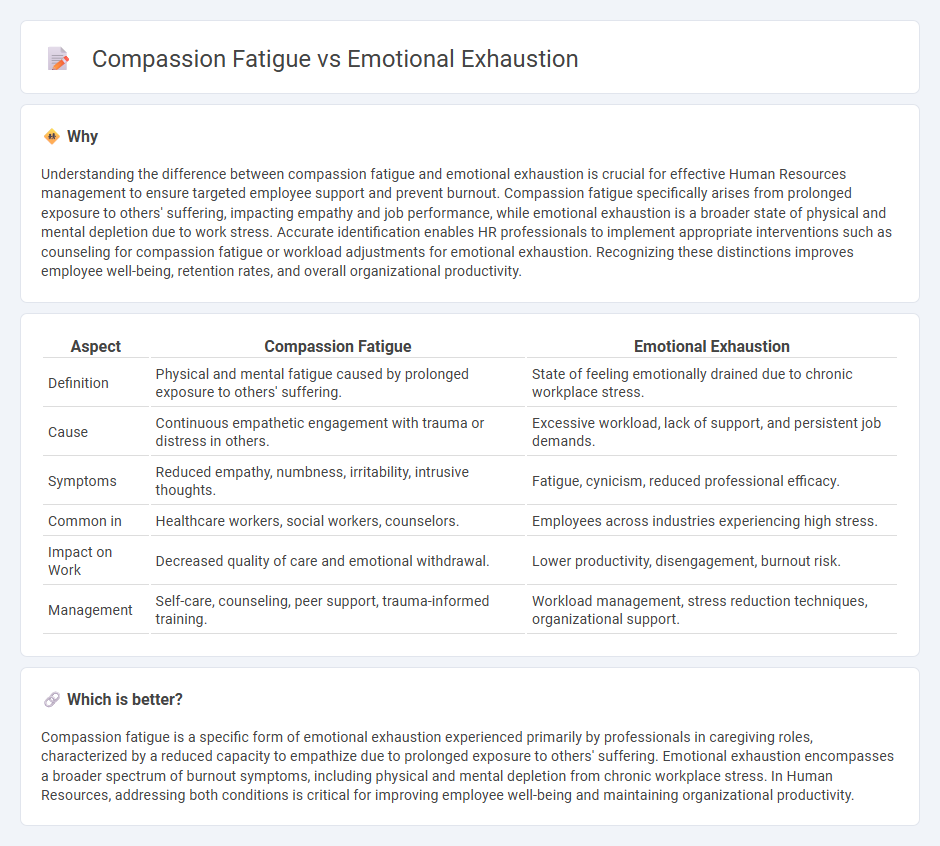
Compassion fatigue and emotional exhaustion are critical issues in human resources, affecting employee well-being and productivity. Compassion fatigue results from prolonged exposure to others' suffering, while emotional exhaustion stems from chronic workplace stress and burnout. Explore key strategies to identify and address these challenges within your organization.
Why it is important
Understanding the difference between compassion fatigue and emotional exhaustion is crucial for effective Human Resources management to ensure targeted employee support and prevent burnout. Compassion fatigue specifically arises from prolonged exposure to others' suffering, impacting empathy and job performance, while emotional exhaustion is a broader state of physical and mental depletion due to work stress. Accurate identification enables HR professionals to implement appropriate interventions such as counseling for compassion fatigue or workload adjustments for emotional exhaustion. Recognizing these distinctions improves employee well-being, retention rates, and overall organizational productivity.
Comparison Table
| Aspect | Compassion Fatigue | Emotional Exhaustion |
|---|---|---|
| Definition | Physical and mental fatigue caused by prolonged exposure to others' suffering. | State of feeling emotionally drained due to chronic workplace stress. |
| Cause | Continuous empathetic engagement with trauma or distress in others. | Excessive workload, lack of support, and persistent job demands. |
| Symptoms | Reduced empathy, numbness, irritability, intrusive thoughts. | Fatigue, cynicism, reduced professional efficacy. |
| Common in | Healthcare workers, social workers, counselors. | Employees across industries experiencing high stress. |
| Impact on Work | Decreased quality of care and emotional withdrawal. | Lower productivity, disengagement, burnout risk. |
| Management | Self-care, counseling, peer support, trauma-informed training. | Workload management, stress reduction techniques, organizational support. |
Which is better?
Compassion fatigue is a specific form of emotional exhaustion experienced primarily by professionals in caregiving roles, characterized by a reduced capacity to empathize due to prolonged exposure to others' suffering. Emotional exhaustion encompasses a broader spectrum of burnout symptoms, including physical and mental depletion from chronic workplace stress. In Human Resources, addressing both conditions is critical for improving employee well-being and maintaining organizational productivity.
Connection
Compassion fatigue and emotional exhaustion are interrelated phenomena commonly experienced by Human Resources professionals due to constant exposure to employee distress and workplace conflicts. Prolonged emotional strain from managing workforce issues without adequate support can deplete HR practitioners' empathy reserves, leading to reduced job satisfaction and increased burnout risk. Understanding this connection is critical for implementing effective wellness programs and resilience training within HR departments to sustain employee engagement and productivity.
Key Terms
Burnout
Emotional exhaustion is a core component of burnout characterized by overwhelming tiredness and reduced capacity to manage work-related stress, while compassion fatigue specifically refers to the emotional strain from repeated exposure to others' suffering, common in caregiving professions. Burnout encompasses emotional exhaustion, depersonalization, and a diminished sense of accomplishment, significantly impacting mental health and job performance. Explore in-depth insights on preventing and managing burnout to sustain emotional well-being and professional effectiveness.
Empathy
Emotional exhaustion refers to the state of feeling emotionally drained and depleted due to prolonged stress or overwork, often impacting overall well-being and job performance. Compassion fatigue specifically relates to the emotional residue or strain from exposure to others' suffering, closely tied to empathy overload in caregiving or helping professions. Explore deeper insights into managing empathy's role in preventing both emotional exhaustion and compassion fatigue.
Emotional resilience
Emotional exhaustion is a state of chronic physical and emotional depletion often caused by prolonged stress, while compassion fatigue specifically relates to the deep emotional strain resulting from repeatedly witnessing others' suffering. Building emotional resilience through mindfulness, self-care practices, and supportive social networks helps individuals recover and maintain psychological strength. Explore effective strategies to enhance emotional resilience and prevent burnout in high-stress environments.
Source and External Links
Emotional exhaustion: Causes, symptoms, and recovery - Emotional exhaustion is a condition resulting from prolonged excessive stress, causing emotional and physical symptoms like irritability, anxiety, depression, brain fog, changes in appetite, and sleep difficulties, which can be managed through lifestyle changes and therapy.
Emotional exhaustion - Wikipedia - Emotional exhaustion is a key symptom of burnout characterized by being emotionally overextended and drained, often resulting from chronic work or personal stress, and is linked with depersonalization and diminished personal accomplishment.
Emotional Exhaustion: Symptoms, Causes, Treatments, and More - Emotional exhaustion involves feeling worn out emotionally from stress in work or personal life, with symptoms including lack of motivation, irritability, hopelessness, and physical fatigue, and requires addressing stressors to prevent long-term health damage.
 dowidth.com
dowidth.com